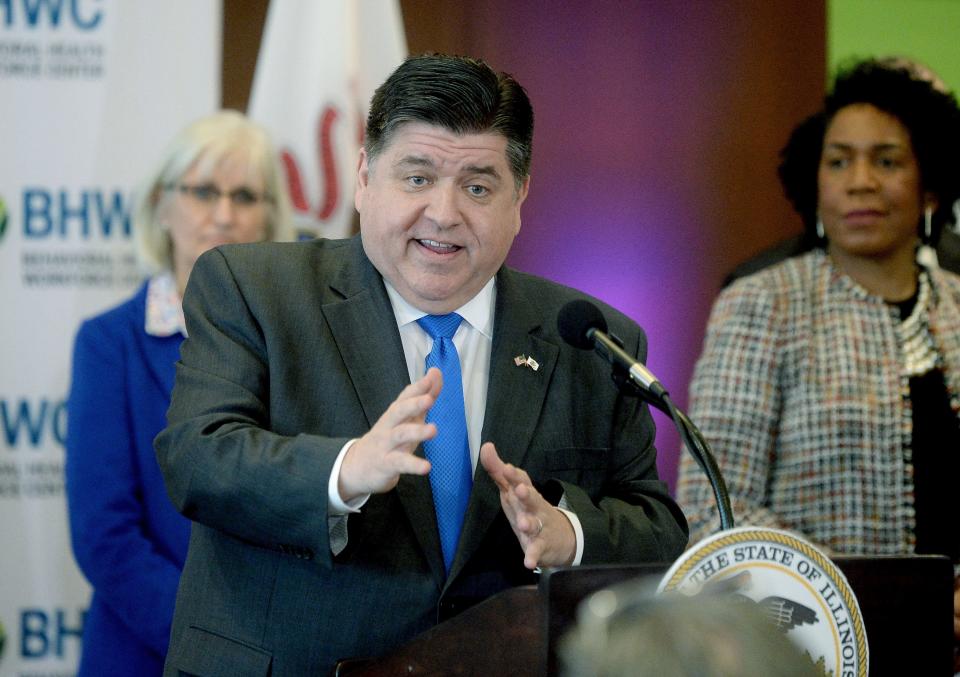Abortion rights vote in Ohio draws Illinois money, possible amendment
- Oops!Something went wrong.Please try again later.
Gov. JB Pritzker enjoyed a victory of sorts in Ohio this week, when voters in the Buckeye State rejected a bid to make it harder to amend its state constitution.
A successful vote would have heightened the threshold to a 60% majority, where its Republican backers had pushed primarily due to a looming vote to codify abortion rights in Ohio. The failed attempt means future attempts to amend the state constitution will still only require a simple majority.
More from Ohio: Ohio voters reject Issue 1, scoring win for abortion-rights supporters ahead of November
Per campaign finance records, Pritzker, who has long championed himself as a defender of abortion access, contributed to $250,000 to Ohioans for Reproductive Freedom PAC. He was joined on the opposite end by fellow Illinoisan and conservative megadonor, Dick Uihlein, who gave $4 million to Protect our Constitution, according to POLITICO.

“What went on in Ohio leading up to the vote last night was solely an effort to stop pro-choice forces from passing an amendment to their constitution. That’s all it was about,” the governor said Wednesday at an unrelated news conference in Springfield on Wednesday. “I’m proud to have supported the ‘vote no.’ That’s the side that supported choice. And it was a resounding victory.”
Supporters of Issue One noted how states like Illinois already have similar thresholds to amend the constitution. The 1970 Illinois State Constitution established a three-fifths majority voting on the question or a majority of those voting in the election for an amendment to pass, doing away with the former two-thirds majority.
Samuel Witwer, president of the 1970 Constitutional Convention, described the adjusted threshold as necessary due to a dismal record of passing amendments in Illinois. The two-thirds majority was, in his words, "perhaps the worst aspect of the old constitution."
"If the convention had done nothing but propose a more liberal amending article, that alone would have made the whole convention effort worthwhile," Witwer wrote in a December 1979 article from The State Journal-Register.
Since the 1970 constitutional provision went into effect, there have been 26 proposed amendments with 15 passing. The most recent proposition, coined the Workers Rights Amendment, passed in November since 54.5% of the total ballots cast were in favor.
For the 11 proposed amendments that failed, six of them did receive a majority vote - meaning they would have passed in states like Ohio. Such was the case in 2012 when an amendment that would have made it more difficult to expand public employee retirement benefits failed despite receiving 56.1% of the vote.
Potential 2024 amendments
Before a proposed amendment can make its way to a ballot in Illinois, state lawmakers first must approve the language in a three-fifths majority in both chambers. If legislative approval is met, the proposal could go to voters in a general election after six months.
Potential amendments mulled over by legislators come 2024 include codifying abortion into the state constitution. The Reproductive Health Act currently guarantees access to abortion, but anti-abortion lawmakers in the future could reverse that with a bill only requiring a simple majority and the governor's signature.
Adding abortion to the state constitution essentially would add more steps to repeal it. The issue could also galvanize voters come next November and benefit Democrats House Speaker Emanuel “Chris” Welch, D-Hillside noted during this year's joint convention of the Illinois Manufacturers’ Association and the Illinois Retail Merchants Association.
“We have done a really good job in Illinois at being the place that folks across the country know is a place where we value women, we trust women,” he said in April. “The issue is one that is pretty clear here, especially here in Illinois. If it is on the ballot, it could potentially help Democratic turnout.”
At the same convention, both Welch and House Minority Leader Tony McCombie were also asked about the potential resurgence of the graduated state income tax - a failed amendment from 2020.
More: Talk of new graduated tax proposals resurface; Gov. Pritzker not 'focused' on them
Sen. Rob Martwick, D-Chicago, floated a possibility earlier this year of a reformed income tax amendment, one that would lower taxes on middle-class Illinoisans while increasing tax revenues for the state. An appetite for a second attempt, however, has not garnered support from Welch or Pritzker.
“You know, one of the things I've learned is you learn a lot in losses. And, you know, we got our butts kicked on that issue,” said Welch. “We have to find a different way to govern, and we've been doing that. And that different way of governing has led to eight credit upgrades and several balanced budgets and surpluses, where we have a rainy-day fund and Illinois is on the right track.”
Reporter Peter Hancock of Capitol News Illinois contributed to this report.
Contact Patrick Keck: 312-549-9340, pkeck@gannett.com, twitter.com/@pkeckreporter.
This article originally appeared on State Journal-Register: Abortion rights vote in Ohio draws Illinois money, possible amendment

